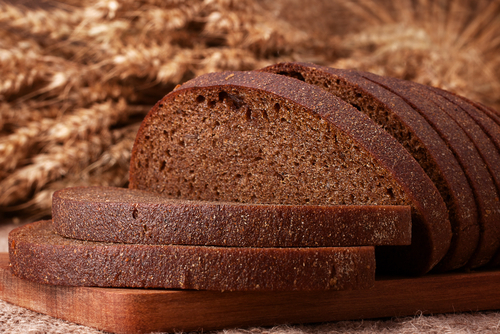Is Rye Bread Bad For You?
Short answer
Rye bread isn’t bad for you - it’s rich in nutrients that help in a number of bodily functions.
Recommended Alternative
Overall beneficial to your health. Things rated a 'B' may have some harmful qualities to pay attention to.
View Full Grading System
Category 'A'
Very healthy and numerous health benefits. Side effects are rare. Things rated an 'A+' are typically necessary for survival (for example, water).
Very healthy and numerous health benefits. A few harmful qualities may be associated, but only under certain circumstances such as an allergic reaction.
Very healthy and numerous health benefits. Harmful qualities may be associated, but aren't usually serious.
It is important to note that even the best things in life can become bad in immoderate amounts. So, although something may be rated an 'A+', overconsumption/overdoing can bring unwanted effects.
Category 'B'
Very beneficial to your health. Things rated a 'B+' may have a few harmful qualities to pay attention to.
Overall beneficial to your health. Things rated a 'B' may have some harmful qualities to pay attention to.
More beneficial to your health than not. However, harmful qualities are most likely associated and shouldn't be overlooked.
The main difference between category 'A' and category 'B' is the harmful qualities typically present in 'B' items. Serious side effects are usually uncommon, but are still possible and should be taken note of.
Category 'C'
Both beneficial and harmful qualities associated. Things rated a 'C+' are typically a bit more on the beneficial side. Still, moderation is important.
A fairly even ratio of beneficial and harmful qualities. Moderation is important. Very general topics that can lean towards both sides of the spectrum will be placed here as well. Rice, for example, can be good or bad depending on the type.
More harmful than beneficial. Side effects are common, especially when consumed/done excessively. Moderation is very important.
Category 'C' usually denotes to both good and bad qualities. When it comes to this category, it is important to keep this word in mind: moderation.
Category 'D'
Harmful to your health. Although benefits may be associated, the bad most likely outweighs the good. Moderation is very important.
Harmful to your health. A few benefits may be associated, but the bad outweighs the good. Moderation is extremely important.
Harmful to your health. Very few, if any, benefits are present. Things in this category should be avoided as much as possible.
Category 'D' is typically for things that are more harmful than beneficial. While consuming/doing something unhealthy once in a blue moon shouldn't hurt, we definitely recommend eliminating 'D' items as a regular part of your routine/diet.
Category 'F'
Category 'F' is for things that fail to bring anything beneficial to the table, and are very harmful to your health. We recommend completely avoiding anything in this category. Long-term side effects of 'F' items are usually very serious.
Category 'N'
'N' stands for neutral. Things placed into this category are generally (a) neither good nor bad for you, or (b) lack the necessary evidence to reach any conclusions.
Long answer
One upside to rye is that it's rich in fiber. You need fiber to keep your gut healthy and to stay regular. It slows the rate at which your body breaks down food - in this way, rye bread can take the edge off of foods that would otherwise spike your blood sugar. Rye has soluble and insoluble fiber; the former can help to sponge up some of the less-savory ingredients in the rest of your meal.
Rye has a low glycemic index - it's slow to digest and thus won't quickly elevate your blood sugar. This is good in general and better for those who suffer from diabetes. There's some related evidence that eating rye bread can help at the genetic level. A study published in the American Journal of Clinical Nutrition looked at the effects of a rye pasta diet on a group of people with metabolic syndrome. Eating a lot of rye pasta suppressed genes that drive an overaggressive insulin response, which helped in turn to curb the effects of their condition.
The same group of researchers expanded on that research with another paper in the same journal. They connected the lower levels of insulin production to less inflammation overall. That's a good thing - more inflammation can push metabolic syndrome to develop into diabetes. A rye-rich diet improves insulin sensitivity, lowers inflammation, and thus reduces the overall risk of developing type-2 diabetes. If you're predisposed to metabolic syndrome or type 2 diabetes, you may want to talk about the benefits of rye with a medical professional.
You'll miss out on many of these benefits if you buy the wrong kind of rye bread. Look for whole grain rye at the top of the ingredients list. Checking the color of the bread isn't enough - many rye breads are dyed brown to disguise the fact that they're made refined flour, which is lower in fiber and doesn't do much for your blood sugar. If you can, look for rye bread that's made from sourdough starter - it's got probiotic qualities that'll safeguard the health of the bacteria which live in your gut.
Ingredients to be aware of
- dye / coloring (some brands)
-
refined flour (some brands)
Benefits
- relatively low glycemic index (good for diabetics)
-
good source of fiber
-
suppresses genes related to an overaggressive insulin response
-
reduces bodily inflammation
-
reduces risk of diabetes
Our Wellness Pick
(what is this?)
Mestemacher Whole Grain Bread
- Rich in whole grains
- Organic ingredients
- High fiber content
- No preservatives
- Convenient 6-pack
Learn More!
Please turn your Ad Blocker off to see this content. Thank you!

 Approved by
Approved by 















